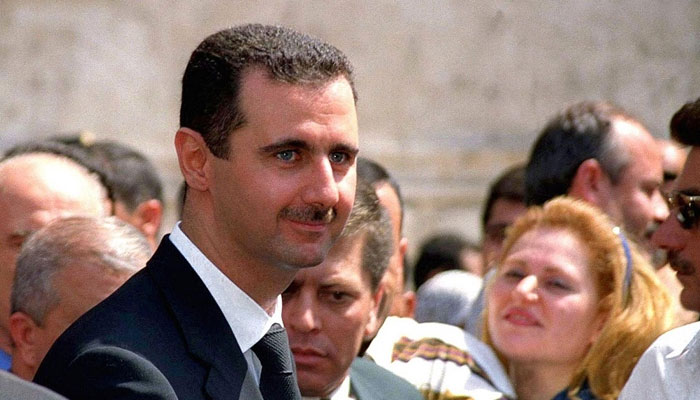Bashar al-Assad’s quarter century in power
PARIS: AFP looks back at almost a quarter century of rule by Syrian President Bashar al-Assad since he was propelled to power following the death of his father Hafez in 2000.
2000: takes over from father
On July 17, 2000, Assad becomes Syria´s new head of state, after the death of his father, aged 69, who ruled Syria with an iron grip for 30 years.
He won a referendum with more than 97 percent of the vote at which he was the only candidate. On June 10, 2000, the day of Hafez´s death, parliament had amended the constitution to lower the minimum age required to become president -- a tailor-made change for Bashar who was born in 1965.
2000: ‘Damascus Spring’
In September that year, 100 intellectuals call for the lifting of martial law, in place since 1963, more freedom and political pluralism. This becomes known as the “Damascus Spring”.
An ensuing period of apparent openness is short-lived.
Assad´s government cracks down on dissent and arrests 10 opponents in July 2001.
2005: withdrawal from Lebanon
In February 2005, former Lebanese prime minister Rafik Hariri is assassinated in a massive Beirut bombing.
Major Western powers and Lebanese opposition blame Syria, which has a strong military presence in Lebanon, and call for the withdrawal of its troops. Damascus denies responsibility.In April, the last of tens of thousands of Syrian troops leave Lebanon, ending 29 years of military and political domination.
2005: ‘Damascus Declaration’
In October 2005, opposition parties unite to launch a joint “Damascus Declaration” calling for radical and democratic change, and criticising “a totalitarian-style and sectarian regime”.
2011: rebellion leads to war
In March 2011, in the turmoil of the Arab Spring that sees people rise up against autocratic rulers, protests break out in Syria calling for civil liberties and the release of political prisoners.
In 2012, the regime uses heavy weapons against the rebels, including airstrikes. It will be accused on numerous occasions of using chemical weapons, charges it denies.
Assad clings on to power with massive military backing from Russia and Iran and Tehran-backed Lebanese militant group Hezbollah, managing to win back most of the territory his regime lost.
A truce is declared in March 2020 after an accord between Russia and Turkey, but the country is dogged by bombardments and sporadic jihadist attacks.
The war has killed more than 500,000 people, displaced half the country´s pre-war population and makes Assad a global pariah.
2021: fourth term
On May 26, 2021, Assad is re-elected as expected for a fourth term, with 95.1 percent of the vote.
2023: Return to the Arab diplomatic scene
Syria had been expelled in 2011 in response to its crackdown on the popular uprising.
2023: international arrest warrant
In November 2023, France issues an international arrest warrant for Assad, suspected of complicity in crimes against humanity for chemical attacks in 2013 in Syria blamed on his regime.
-
 Keke Palmer Makes Jaw-dropping Confession About 'The Burbs'
Keke Palmer Makes Jaw-dropping Confession About 'The Burbs' -
 Cher Sparks Major Health Concerns As She Pushes Herself To Limit At 79
Cher Sparks Major Health Concerns As She Pushes Herself To Limit At 79 -
 Former NYPD Detective Says Nancy Guthrie's Disappearance 'could Be Hoax'
Former NYPD Detective Says Nancy Guthrie's Disappearance 'could Be Hoax' -
 King Charles Publicly Asked If He Knew About Andrew's Connection To Epstein
King Charles Publicly Asked If He Knew About Andrew's Connection To Epstein -
 Jessie J Addresses Pregnancy Rumors After Sporting Belly Bump
Jessie J Addresses Pregnancy Rumors After Sporting Belly Bump -
 Channing Tatum Leaves Fans Scratching Their Heads With Message About South Korea
Channing Tatum Leaves Fans Scratching Their Heads With Message About South Korea -
 Emma Roberts Stars In 'A Body In The Woods'
Emma Roberts Stars In 'A Body In The Woods' -
 'Our Estrangements Can Kill Us': Meghan's Co-star Weighs In On Anthony Hopkins Interview
'Our Estrangements Can Kill Us': Meghan's Co-star Weighs In On Anthony Hopkins Interview -
 ‘Tone Deaf’ Andrew Called Out Over Arrogant Behaviour Amid Epstein Scandal
‘Tone Deaf’ Andrew Called Out Over Arrogant Behaviour Amid Epstein Scandal -
 Singing, Dancing & Outperforming: Watch China’s Robot Fair Ahead Of Spring Festival 2026
Singing, Dancing & Outperforming: Watch China’s Robot Fair Ahead Of Spring Festival 2026 -
 WhatsApp Under Fire: EU Steps Up Pressure On Meta Over Claims Of Blocking AI Rivals
WhatsApp Under Fire: EU Steps Up Pressure On Meta Over Claims Of Blocking AI Rivals -
 Steven Van Zandt Criticizes Bad Bunny's 2026 Super Bowl Performance
Steven Van Zandt Criticizes Bad Bunny's 2026 Super Bowl Performance -
 Katie Price Seen With New Hubby Lee Andrews Weeks After Tying The Knot
Katie Price Seen With New Hubby Lee Andrews Weeks After Tying The Knot -
 Biggest Order Yet Issued Against Andrew Mountbatten-Windsor: King Charles You Have To’
Biggest Order Yet Issued Against Andrew Mountbatten-Windsor: King Charles You Have To’ -
 ByteDance’s Seedance 2.0 Marks New Era Of Cinematic AI-generated Videos: Here’s How
ByteDance’s Seedance 2.0 Marks New Era Of Cinematic AI-generated Videos: Here’s How -
 Struggling With Obesity? Here's How To Manage It
Struggling With Obesity? Here's How To Manage It




